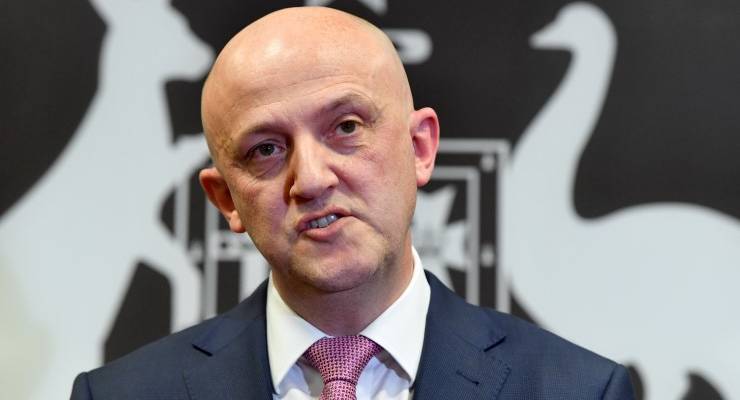
The head of the Australian Security Intelligence Organisation (ASIO) Mike Burgess is continuing the war of security agencies on privacy, telling a podcast that agencies needed backdoors into encrypted communications and that concerns about abuse of powers by security agencies were “just simple nonsense”.
To save time in parsing the claims of national security bureaucrats about encryption, we’ve prepared this handy guide to the claims about, and the reality of, ASIO’s demand that no one be allowed to have any privacy in their communications.
What agencies say their powers will be used for
All power grabs by security agencies are justified by three things: terrorists, paedophiles and organised crime. Data retention was justified by the Abbott government because it would only be used by a small number of agencies to investigate “serious offences” and “the worst of the worst”.
Then-attorney-general George Brandis insisted that the Turnbull government’s laws to force companies to provide backdoors to encrypted communications system — which would, Malcolm Turnbull famously insisted, override the laws of mathematics — “could be used to tackle terrorism, or serious organised crime such as paedophile networks”.
What the powers are actually used for
Whistleblowing, journalism and public scrutiny — data retention has been used repeatedly and illegally to track down journalists’ sources and pursue whistleblowers who have embarrassed the government. The phone records of cross-bench politicians have also been targeted by security agencies.
Rubbish dumping, parking fines — as a review of data retention laws has shown, data retention laws have also been used by bodies such as local councils, a racing integrity regulator, taxi bodies, veterinary bodies and anti-dumping agencies.
Commercial espionage — the Australian Signals Directorate, which Burgess used to head, is notorious for spying on Indonesian trade negotiators to pass on commercial intelligence to the US government. Defence Signals Directorate, as it was then known, had also spied on the Indonesian president and his family, as well as a climate conference held in Bali.
The most famous piece of Australian espionage in recent decades was its illegal spying on the Timor-Leste cabinet to benefit resources company Woodside, for whom the man who ordered the spying, Alexander Downer, later worked.
What is encryption really used for?
Despite the insistence of Burgess and government ministers that encrypted messaging is the province of terrorists and criminals, it is used for a wide variety of legitimate purposes:
Banking and commerce — without encryption, the entire economy would grind to a halt. Not merely would all financial transactions be compromised, but the routine exchange of confidential and market-sensitive information would be impossible. Amongst the biggest users of encrypted communications technology is the government itself.
Whistleblowing, activism, legal work and journalism — “if you’ve done nothing wrong, you have nothing to hide”. Except in some professions and roles, doing right necessitates having something hide. Only through end-to-end encryption can people who want to expose the powerful do so with a measure of safety. The ability for dissidents to communicate without governments knowing, the ability of whistleblowers to contact journalists and lawyers without their anonymity being compromised, the ability for the innocent to mount defences against malicious prosecution, all depend on encryption.
Everyday life — in fact, everyone has something to hide. That’s why we have curtains on our windows, locks on our doors and don’t share intimate details of our lives with everyone. That’s why areas like medical records have tight restrictions on who can access them. That’s why we don’t tell everyone our financial history or family secrets. Encrypted communications are basic to the kind of privacy that, despite all the claims that “privacy is dead”, we all still treasure.








Those who wilfully will not see seem to think they’ve got a bloody good excuse for missing the “unforeseeable”.
What is this cult of bald/shaved-headed men – Mike Burgess, Peter Dutton, Josh Frydenberg, Mike Pezzullo – all trying to look like tough gangsters and stand-over men? Is Baldism the new Fascism? Il Duce would be thrilled.
This is a good piece from Keane. It serves a much wider interest than those conspiracy theorist bashing novelettes that he seems to love…yawn.
“Il Duce would be thrilled” “What is this cult of bald/shaved-headed men ?”
I dunno either Norm, but something should be done about it.
“Hair today, gone tomorrow”
Yeah, I haired you. Hairless of the dog.
And we ban Huawei.
“that concerns about abuse of powers by security agencies were “just simple nonsense”.”
Well, he would say that, wouldn’t he. The logic is that anything they use the data is, ipso facto, not an abuse because, well, they used it.
Those worst of the worst parking fines. That’ll teach ’em.
As with a cashless society, when we are all just our digital record, will we still exist as separate, individual entities?
Try having an incorrect credit blackmark removed – imagine how resistant the secret squirrel ratbags are to having their fallacies rectified.
All government/military intelligence (coff, coff) uses the UK derived Admiralty Rating classification, A-F/1-6 so that A1 is documented, proven fact, B2 would be usually reliable/possibly true down to F6 which is hearsay, anecdote or unverifiable rumour.
The vast majority of the mass of “information” is below C3 which is “Doubt of authenticity, trustworthiness/Possibly True: Not confirmed”.
I’m reassured…